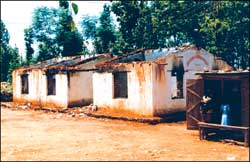 The ceasefire has held for nearly four months, the royal appointed government was specifically mandated to streamline the bureaucracy and deliver development, the country is cash-rich. Yet, everything is at a standstill.
The ceasefire has held for nearly four months, the royal appointed government was specifically mandated to streamline the bureaucracy and deliver development, the country is cash-rich. Yet, everything is at a standstill. With only six weeks to go till the end of the fiscal year, 30 percent of the development budget is unspent. Donors, who foot three-quarters of this money, are getting worried about the government's inability to spend money when the need is so great.
"There is an extreme lack of urgency in Kathmandu," said one donor agency representative in the capital. "If a crisis like this doesn't get people going, you wonder what will."
Infrastructure destroyed by the Maoists need to be rebuilt, entire districts in the midwest require basic services, and all over the country development projects which have languished for the past five years have to be kick-started again. But Kathmandu is paralysed by inaction.
The irony is that the country's macro-economic situation has never looked better. Buoyed by remittances from Nepalis abroad, our foreign currency coffers are enough to pay for 11 months of imports. Liquidity grew by six percent compared to last year. The government's cash savings have gone up from Rs 740 million overdraft last year to a surplus of Rs 1 billion. Remittances have more than made up for the fall in tourism receipts and export.
Development expenditure (agriculture, transportation, health and education) is down, but regular expenditure (salaries, civil service, overheads) is up by Rs 3 billion from last year. Defence spending is up by Rs 1 billion to to more than Rs 7 billion this year.
As happens at the end of every fiscal year, the development section of the Finance Ministry is a busy place these days. Up to Rs 700 million is being released every week as various agencies try to beat the deadline to prevent their allocation from lapsing. So how come we are cash-rich, but development-poor?
Despite the ceasefire, the ground situation in the districts is still far from normal. (See report from Salyan District, page 4-5.) Mobile health clinics and government teams have been prevented from entering Maoist-controlled areas. Extortion, intimidation, especially at schools, is still rife. Even aid agencies are reluctant to send their staff to outlying areas.
And then there is the absence of locally elected bodies. Ever since elected village and district councils were
dissolved by the Deuba government in July 2002, there has been a development vacuum at the grassroots. In the next phase of the agitation against the royal move, the five main political parties want to re-occupy them.
"The lack of development is not caused by the security situation, the real reason is that there are no peoples' representatives at the district and village level," says Krishna Sapkota of the Federation of District Development Committees. Without the local councils, no one is accountable to the people and there is no one to push the development agenda, he adds.
The Kabhre DDC, for instance, hasn't yet received a Rs 3 million allocation for rural roads the government had promised earlier this year. The reason? "Since we are not there to push, no one takes any notice," Sapkota says.
At the VDCs, most secretaries are absent. Officials from line ministries don't venture beyond the district headquarters. "Money is being spent on paying salaries not to fund development projects," says economist Dilli Raj Khanal. "These bureaucrats simply have no interest in doing anything to help the village because they are not accountable to the people."
While the peace talks go into the third round, it is clear that neither side is really interested in development, reconstruction and rehabilitation. The Maoists want political issues resolved first, and development figures even less in the agenda by the political parties.
Donors are taking time to wait and watch whether the present peace will last. They want to be sure that the country doesn't go back to war, and also who will implement the projects in the absence of local representatives.
Richard Vokes, country director of the Asian Development Bank sums it up: "People are not willing to go to the rural areas because the situation is not normal yet, and there are no local bodies to implement projects."
The civil service, too, doesn't want to take any chances as long as there is no peace agreement in black and white. With officialdom taking a laid back attitude, there isn't much the aid agencies can do.
"There is certainly a bottleneck there," says Gert Meinecke, the Danish Charge d'Affaires. "There has to be a political solution so that the people's representatives who are accountable to their communities can do the job."
The National Planning Commission estimates that Rs 2 billion will be needed for reconstruction of infrastructure destroyed by the Maoists. "Some donors are ready to foot the bill, but they want this separated from the usual development budget," Shankar Sharma of the NPC told us.


